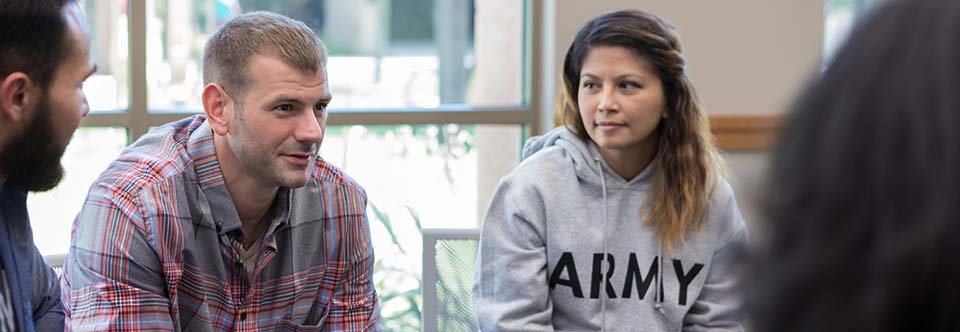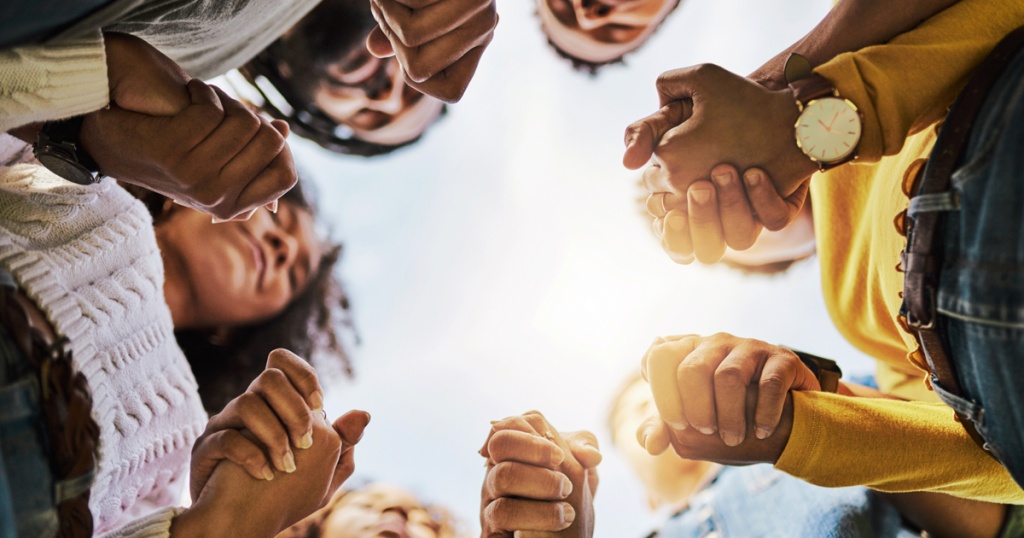Coping with an addiction can be isolating. Individuals who experience a dependency to drugs, alcohol, or other substances cope with negative feelings such as shame, embarrassment, and self-defeating thoughts. Some addictions strain familial relationships, leaving the individual feel alone or cut-off from previous social circles. Recovery is often referred to as the opposite of isolation, since in recovery you find a community of supportive peers and clinicians.
It is essential – especially early in recovery – to find a support community. Peer support community in addiction recovery is vital for sustaining your sobriety. An effective support community will help you avoid feelings of isolation, establish camaraderie with like-minded peers, and allow you to make connections with others who are experiencing the same feelings as you.

Finding a Support Community in Addiction Recovery
Recovery is so much more than the cessation of behaviors associated with addiction. Achieving a sustainable recovery requires making lifestyle changes that focus on overall wellness – taking charge of your physical, emotional, spiritual, and mental health. One of the best ways to take care of all aspects of your health is through a community. When peers come together with a shared mission of recovery, the development of other healthy lifestyle habits often results.
One of the most common thoughts in early recovery is “how will I have fun without drugs or alcohol?” This is not an unusual feeling and one that you will likely share with your peer support community. However, when you develop a network of sober supports, you will find that there are many ways to have fun and connect in recovery.
A social support community is especially important when a person new to recovery does not feel comfortable socializing with family or friends who still drink alcohol or use substances. Developing and accessing peer support can lead to the cultivation of new hobbies or wellness activities – for example, a weekly game of pickup basketball or joining a recreational league.
Types of Addiction Support Groups
Joining a community of peer support allows you the opportunity to get to know people who are in the same stages of recovery as you are, as well as those who are far further into the journey. An addiction support group will not only help you connect to others, it also will provide examples of what long-term recovery looks like. Through group discussions, you can learn how others cope with triggers, overcome obstacles, and talk about their experiences in a secure and supportive environment.
Things you may not feel comfortable discussing with family members, you may feel safe talking about with peers. Talking through your feelings, anxieties, triggers, and craving are all essential to your ongoing recovery – especially in the earliest stages when you are still developing healthy coping mechanisms.
There are several different types of support groups that emphasize sobriety, such as Narcotics Anonymous (NA), Alcoholics Anonymous (AA), and SMART Recovery. As large, national networks, it will likely be easy to find opportunities close to you that mesh with your schedule. Your therapist may also be able to recommend meetings and social support opportunities near you. In some cases, therapy-based support groups (i.e. group therapy) may be the best approach, especially for the ongoing treatment of co-occurring substance use and mental health disorders. No matter which type of support group or therapy you choose, it is important that you feel comfortable sharing with the group and listening to the experiences of the other members.

Accountability as an Aftercare Support
Aftercare supports are essential for holding you accountable to your recovery and your goals. When your support group has shared experiences, you will feel more comfortable reaching out for help when the need arises. A good peer support group provides actionable advice and insight, based on real-life scenarios that mirror your own experiences. When you become actively involved in an aftercare support community, you are more likely to recognize your behavioral triggers and respond to them in a healthy way. When you regularly spend time with supportive peers, they get to know you, your personal struggles, and can provide much-needed perspective based on their own experiences.
Aside from accountability, finding a social support group in recovery is also motivating. Your social supports will share your values and interests. As your relationships evolve, you will likely find that these mutual interests extend beyond sustaining recovery – for example, you might find that you share an interest in the same music or hobbies. As you build onto these friendships, you will develop a support community that not only helps you stay on track with your sobriety, but also provides you with enjoyable experiences.
Finding a Peer Support Community
 If you are newly in recovery, you may be wondering where you start looking for a social support group. Your therapist is a good place to start – they can provide you with local resources to keep you on track. Keep in mind that there are over 23 million people across the United States just like you – at various points of recovery. The Substance Abuse and Mental Health Services Administration (SAMHSA) has a list of resources on their website that can point you to support groups and other ideas for connecting with aftercare support.
If you are newly in recovery, you may be wondering where you start looking for a social support group. Your therapist is a good place to start – they can provide you with local resources to keep you on track. Keep in mind that there are over 23 million people across the United States just like you – at various points of recovery. The Substance Abuse and Mental Health Services Administration (SAMHSA) has a list of resources on their website that can point you to support groups and other ideas for connecting with aftercare support.
In addition to finding a sobriety-specific support community, you can also connect with peers through other community-based avenues. Examples include volunteering for an organization you care about or joining a wellness community such as a gym or running club. If you have been looking for a chance to learn a new skill or develop a new hobby, this is it! Join a reading group, painting class, or any other activity that piques your interest. Keeping your mind, body, and spirit engaged is an essential aspect of maintaining your recovery.
Overcoming Common Challenges of Recovery
One of the most important functions of social support groups is that they allow you to overcome the most common challenges of early recovery. During your treatment, you likely had to let go of old relationships and seriously examine your social life. Family and friends may not always understand the changes you make. For example, when you are in early recovery, you may find old drug associates or friends trying to reach out to you. Your friends and family members may still be participating in the activities in which you are trying to abstain. Lastly, in early recovery, you are still trying to navigate open communication with others, admitting your past behaviors, and working through the emotions connected with your substance use disorder.
Accomplishing all this while newly in recovery can seem like a Herculean task. Letting go of your old, toxic relationships and cultivating new ones with sober supports is essential to overcoming the challenges of early recovery. Forging new relationships with people who actively support your recovery will make your experience more enjoyable – while allowing you to rise to the challenges that accompany it.
Recovery requires a constant commitment and dedication to the journey ahead of you. Building a support community is essential not only to maintaining your sobriety, but in finding the joy in new friendships, hobbies, and activities. Forging relationships with those with common interests and value systems will allow you to move forward with your healthier, happier life.
References:
Saleebey, D. (2002). The Strengths Perspective in Social Work Practice: Extensions and Cautions. Social work, 47(3), 296–305. Retrieved from https://psycnet.apa.org/record/2003-03854-006
Stanford, M. S. (2007). Demon or disorder: A survey of attitudes toward mental illness in the Christian church. Mental Health, Religion & Culture, 10(5), 445-449. Retrieved from https://www.tandfonline.com/doi/abs/10.1080/13674670600903049
Buckingham, S. A., Frings, D., & Albery, I. P. (2013). Group membership and social identity in addiction recovery. Psychology of Addictive Behaviors, 27(4), 1132–1140. Retrieved from https://psycnet.apa.org/record/2013-13284-001
Strickland, J. C., Stoops, W. W., & Rush, C. R. (2023). Examining Symptoms of Stimulant Misuse and Community Support Among Members of a Recovery-Oriented Online Community. Journal of Psychoactive Drugs, DOI: 10.1080/02791072.2023.2228781. Retrieved from https://www.tandfonline.com/doi/abs/10.1080/02791072.2023.2228781
Johnson, D. P., Penn, D. L., Fredrickson, B. L., Kring, A. M., Meyer, P. S., Catalino, L. I., & Brantley, M. (2011). A pilot study of loving-kindness meditation for the negative symptoms of schizophrenia. Schizophrenia Research, 129(2-3), 137-140. Retrieved from https://www.tandfonline.com/doi/abs/10.1080/17439760.2012.677467




